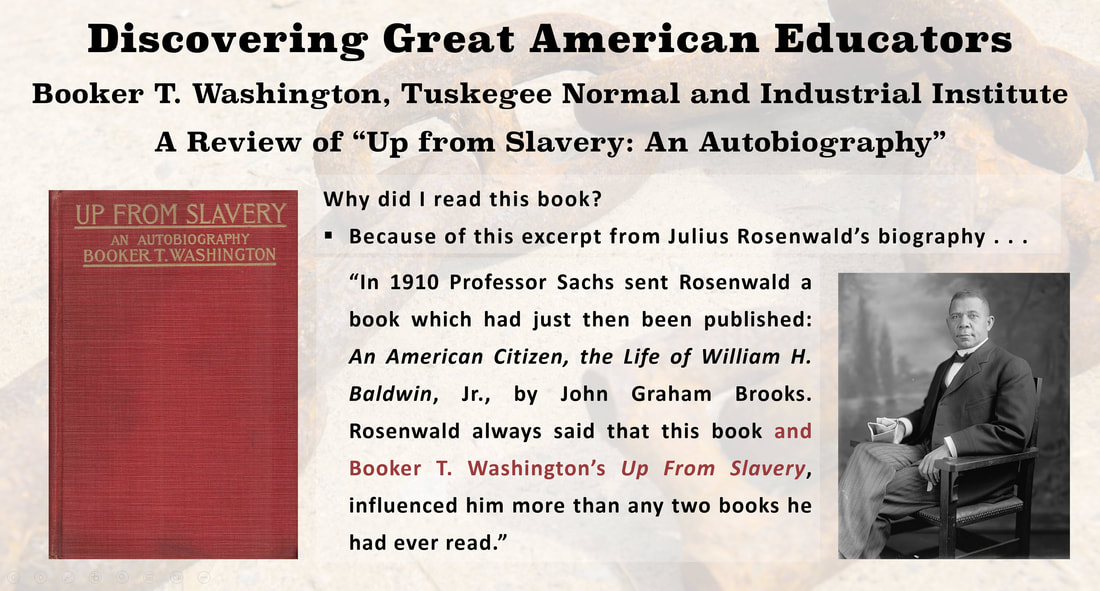Review of Booker T. Washington's "Up from Slavery"
|
|
Date Published: June 25, 2021
Date Modified: March 15, 2023 |
“Then, when we rid ourselves of prejudice, or racial feeling, and look facts in the face, we must acknowledge that, not-withstanding the cruelty and moral wrong of slavery, the ten million Negroes inhabiting this country, who themselves or whose ancestors went through the school of American slavery, are in a stronger and more hopeful condition, materially, intellectually, morally, and religiously, than is true of an equal number of black people in any other portion of the globe.
“This is so to such an extent that Negroes in this country, who themselves or whose forefathers went through the school of slavery, are constantly returning to Africa as missionaries.”
“This is so to such an extent that Negroes in this country, who themselves or whose forefathers went through the school of slavery, are constantly returning to Africa as missionaries.”
Booker T. Washington, Up from Slavery
A Review of “Up from Slavery” an Autobiography by Booker T. Washington
- Reviews of the Day: 1901
- Interesting Insights from “Up from Slavery”
- Washington on Prejudice
- Washington on Love and Hate
- Washington on Work
- This Author’s Perceptions of “Up from Slavery”
Reviews of the Day: 1901
|
“Mr. Washington says his whole life has been one of surprises, and doubtless none has been greater than the warm reception given this autobiography when it began its serial publication in Outlook. He has stood, as much as any man, for the good old Anglo-Saxon gospel of work, and this new flood of praise from his greatest fellow citizens does not turn him from it.
“The serial publication has … brought about a large demand for the book before publication. This is the sort of a story, full of romance and practical wisdom, that will make one of the widely read books of the year.” The Rochester Democrat and Chronicle, March 1901
“A chapter which the author devotes to his methods of raising money is full of good humor and good sense, and it reveals in a marked manner the superior and endearing traits of Booker T. Washington’s character. A man who receives thousands of dollars in trust from such men as Collis P. Huntington, Andrew Carnegie, Morris K. Jessup, and others like them, must be a person of most convincing worth.
|
“Mr. Washington says that all he has ever had to do in collecting money was to give people of wealth an opportunity to help, and that he has nowhere met such a fine spirit of generosity as in Boston.”
The St. Louis Republic, “Booker T. Washington,” March 1901
Interesting Insights from "Up from Slavery"
- Booker T. Washington on Racial Prejudice
“I used to cherish a feeling of ill will toward anyone who spoke in bitter terms against the Negro, or who advocated measures that tended to oppress the black man or take from him opportunities for growth in the most complete manner. Now, whenever I hear any one advocating measures that are meant to curtail the development of another, I pity the individual who would do this.
“I know that the one who makes this mistake does so because of his own lack of opportunity for the highest kind of growth. I pity him because I know that he is trying to stop the progress of the world, and because I know that in time the development and the ceaseless advance of humanity will make him ashamed of his weak and narrow position.
“One might as well try to stop the progress of a mighty railroad train by throwing his body across the track, as to try to stop the growth of the world in the direction of giving mankind more intelligence, more culture, more skill, more liberty, and in the direction of extending more sympathy and more brotherly kindness.”
- Booker T. Washington on the Spirit of Love and Hate
“I learned the lesson that great men cultivate love, and that only little men cherish a spirit of hatred. I learned that assistance given to the weak makes the one who gives it strong; and that oppression of the unfortunate makes one weak. It is now long ago that I learned this lesson from General Armstrong, and resolved that I would permit no man, no matter what his color might be, to narrow and degrade my soul by making me hate him.”
- Booker T. Washington on Work
“There is a physical and mental and spiritual enjoyment that comes from a consciousness of being the absolute master of one’s work, in all its details, that is very satisfactory and inspiring. My experience teaches me that, if one learns to follow this plan, he gets a freshness of body and vigor of mind out of work that goes a long way toward keeping him strong and healthy.
“I believe that when one can grow to the point where he loves his work, this gives him a kind of strength that is most valuable.”
This Author's Perceptions of "Up from Slavery"
I read this book because Julius Rosenwald said it was one of two books that most affected his life.
While I was pondering how to start off this review of one of America’s classics, I saw an article entitled, “Be the design you want to see in the world.” I thought to myself that this summarizes the goal of this book and the life of Booker T. Washington better than anything I would ever come up with.
His goal was to make his life the design of a life well lived. Of course, lived as a black person but also as a human being. If anyone limits their life and goals to a single race, they are limiting the potential of great men and women to affect the course of their lives.
While I was pondering how to start off this review of one of America’s classics, I saw an article entitled, “Be the design you want to see in the world.” I thought to myself that this summarizes the goal of this book and the life of Booker T. Washington better than anything I would ever come up with.
His goal was to make his life the design of a life well lived. Of course, lived as a black person but also as a human being. If anyone limits their life and goals to a single race, they are limiting the potential of great men and women to affect the course of their lives.
|
In high school, we read and openly discussed the book, Black like Me. I wish this would have been a follow-on assignment. Mr. Washington today speaks to me not as a black man, but as a man who transcended race. He accomplished what he wrote, “The individual who can do something that the world wants done will, in the end, make his way regardless of his race.”
As an optimist, I believe the world wants to treat each individual as an individual, avoiding stereotypes. This book of Mr. Washington appealed to me regardless of our racial differences. It was just one human being writing to another in the hope of achieving a better world for all of us.
|
Select image to download "Up from Slavery" in PDF format at HathiTrust.
|
I can see why Julius Rosenwald was so affected by this book.
Me too!
Cheers,
- Peter E.
Me too!
Cheers,
- Peter E.


